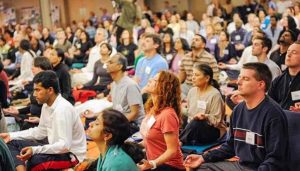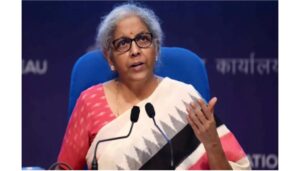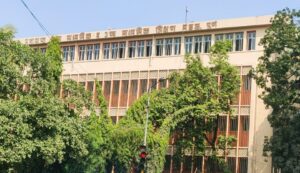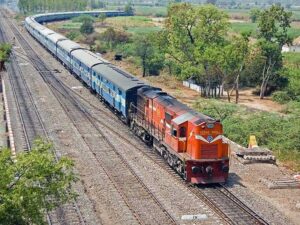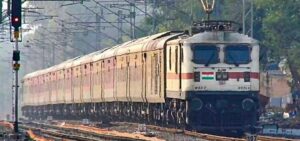Latur, Osmanabad, Hingoli and Washim districts in Maharashtra did not have any new COVID-19 case in the last 14 days: Health Ministry
New Delhi / Mumbai, April 21, 2020
The number of COVID-19 positive cases stands at 18,601 as on date. 3,252 people have recovered, which takes the recovery rate to 17.48%. A total of 705 people recovered yesterday, which happens to be the highest number of recoveries in a single day till now. Also, a total of 590 people in the country have died because of the COVID-2019 infection till date. In the last 24 hours, 1,336 new cases and 47 deaths have been reported. This was informed by the Joint Secretary, Ministry of Health & Family Welfare, Shri Luv Aggarwal, at the daily media briefing on the actions taken, preparedness and updates on COVID-19, held at National Media Centre, PIB New Delhi today.
Latur, Osmanabad, Hingoli and Washim from Maharashtra have not reported any new COVID-19 case in the last 14 days. This takes the number of districts having no new cases to 61, stated the Joint Secretary. However, Bhiwani in Haryana has been dropped from this list. Pratapgarh in Rajasthan has been added to the list of Mahe (Puducherry), Kodagu/Coorg (Karnataka) and Pauri Garhwal (Uttarakhand) – the districts where no fresh COVID-19 case has been reported for the last 28 days, he further informed.
The Joint Secretary informed that the Health Ministry has issued guidelines to be followed on detection of suspected or confirmed COVID-19 case in a Non-COVID facility. This has been done based on reports of health care workers contracting COVID-19 infection leading to closure of hospitals and those of unrelated cases turning out to be positive. Hospital Infection Control Committee has been made responsible for monitoring these issues. The Committee has to ensure that healthcare workers are oriented about infection prevention and control guidelines. The case is to be informed to local health authorities and the patient to be transferred to isolation ward of that hospital. Such a patient is to be provided with a mask and only one dedicated health worker should attend to that patient. The health worker should also take required preventions. Based on clinical status, if required, the patient is to be transferred to a dedicated COVID facility by following standard precautions. The facility shall be disinfected. All contacts of this patient shall be quarantined and followed up for 14 days. All close contacts shall be put on HCQ for a period of 7 weeks keeping in mind the contraindications of HCQ also. If any health care worker gets infected, he or she must be removed from roster and his or her close contacts should be quarantined for 14 days. Keeping occurrence of COVID-19 in mind, hospitals should keep a contingency plan ready alongside staffing plan to continue operations. Based on the scope of the cluster and the degree to which the hospital is affected, and the degree of risk associated with the patient, like in the case of any chronic disease, the hospital should carry out adequate disinfection and then continue its functions. If more positive cases get reported, then that particular section of the health facility can be temporarily shut down. If the source of infection is not detected or large number of cases gets reported, then it can be converted into a COVID facility. At the same time, to reduce undetected contact and spread of infection between patients and healthcare workers in all hospitals, active screening of all employees can be done on a daily basis in the hospital and triaging guidelines should be followed in Outpatient and Emergency Departments of hospitals.
The Joint Secretary further informed:
- Health Minister has written to the health departments of all states and UTs to ensure adequate availability of blood in blood banks. Blood disorders like thalassemia, sickle cell anaemia and haemophilia require regular blood transfusion. Current stock status of all blood groups based on real time should be monitored through online portal e-RaktKosh.
- Indian Red Cross has started a 24X7 control room for blood services in Delhi. The numbers are: 011 23359379, 93199 82104 and 93199 82105.
- CSIR is starting a randomized, blinded, two arms, active comparator-controlled clinical trial to evaluate drug efficacy of critically-ill COVID-19 patients to reduce mortality.
- Department of Biotechnology has invited applications for support in COVID-19 Consortium for medical equipment, diagnostics, therapeutics, development of drugs and vaccines in order to address health care challenges. 50 such proposals have been received, out of which 16 have been recommended for funding support.
- A multifaceted approach is being adopted for National Biopharma Mission, through which vaccine candidates utilising different platforms and at different stages of development are being fast-tracked. Existing vaccine candidates and novel vaccine candidates are being repurposed for which funding support is being recommended. Support is being provided to development of DNA Vaccine for fighting against COVID -19, which is being utilised by vaccine candidates.
Informing that MHA is continuously monitoring lockdown implementation along with states, the representative of the Home Affairs Ministry stated:
- MHA had issued revised lockdown guidelines on April 15, by which certain movements were prohibited till May 3. At the same time, certain sectors, mainly rural sectors were given certain relaxations from April 20, in order to promote agricultural activities and encourage rural economy.
- An SOP was also made and shared with states for intra-state movement of labourers, so that the labourers, especially those who are in relief camps, can take part in permitted activities and be employed.
- Centre has sent six inter-ministerial teams to 4 states for helping the state governments with health and medical infrastructure and disaster management, so that Centre and states can fight against COVID-19 together and be successful.
- Ground level survey of lockdown in different districts have revealed that many sectors where relaxations were given for movement, have made a good start. In many rural sectors, MNREGA works have been started, road development works have also been started in some states, brick factories have also started work. Migrant labourers are being involved in these works. Rural public are aware and are using masks and gamcha in many places.
A total of 4,49,810 COVID-19 tests have been done till yesterday, informed the representative of ICMRH, out of which 35,852 tests were done yesterday. 29,776 of these tests were performed in the 210 ICMR network labs, while 6,076 were done in private labs.
Informing that Rapid Antibody Test kits have been supplied to all states, Dr Gangakhedkar informed that one state has complained of lesser detection of cases which have been found to be positive based on RT-PCR test. He said that a variation of 6% – 71% detection rate has been found among positive samples of RT-PCR, He said this for further investigation. It has been decided that 8 ICMR institutes will be sending teams to the field in the coming 2 days, where they will perform the test and validate the kits from different lots. He further stated, states will be advised to not perform tests in the coming two days. ICMR will be in a position to identify problematic batches and ask the company to replace them, if required.
The Chairman of Empowered Group – 4 for COVID-19 which was formed for augmenting human resources and capacity building, also took part in the briefing. Eleven such empowered groups were formed on March 29, 2020, under Disaster Management Act, 2005.
He stated that:
- A database which is available in public domain was formed for the use of district administration, municipal administration and state governments, based on which resources can be used for capacity building after prior training. covidwarriors.gov.in is a master database for healthcare professionals and volunteers, which has details of 1.24 crore human resources. Details of state and district level coordinators, field level workers are also available in this database having 20 categories and 49 sub-categories of human resources who are involved in fighting COVID-19. Data of individuals can be accessed only by District magistrates, Municipal Authorities and State Government.
- Details of 201 hospitals run by CPSUs, 49 ESIC hospitals, 50 Railways hospitals, 12 Port hospitals and 13 other hospitals belonging to OFB, HAL and others are available in the database, along with details of doctors, nurses, paramedics, beds and other facilities etc.
- Volunteers have been taken for three broad purposes – monitoring social distancing in banks, ration shops, mandis etc., delivering essential commodities and field surveillance in containment zones, curative works.
- This database provides assistance to state governments in moving health professionals from a district to another, as per needs.
- The portal igot.gov.in in DISHA platform is for providing training to all human resources by means of anytime, anywhere onsite delivery of training materials. Till date, 14 courses, 53 modules, 113 videos and 29 training documents have been made available. The courses include various aspects of COVID-19 management, starting from laboratory testing, collection, quarantine management to ICU and ventilation management.
- The training modules are available in some regional languages and efforts are on to make training materials available in all regional languages.
- In less than 2 weeks 1,31,440 users have registered and around 89 thousand have completed training. 40,000 Indian Red Cross volunteers are working in 550 districts, around 3500 NCC cadets and 553 NCC staffs are engaged in 68 districts across 16 states and 3 UTs and 47,000 more cadets have also enrolled.
- 1.80 Lakh ex-servicemen have been identified by Sainik Boards for deployment; some are already engaged for community surveillance. 15000 AYUSH professionals are deployed in 15 states and 2 UTs for quarantine management, more than 1 lakh AYUSH professionals and 55 thousand students have also been trained to be deployed.
- 27 lakh NYKS and NSS volunteers are helping civic authorities at markets, banks, mandis and public places, providing food, grocery and medicines to needy and quarantined families and conducting sanitation drives. Volunteers are working to raise awareness about Aarogya Setu and taking care of senior citizens.
LIVE tweets by @PIB_India from the media briefing can be found on this thread.

